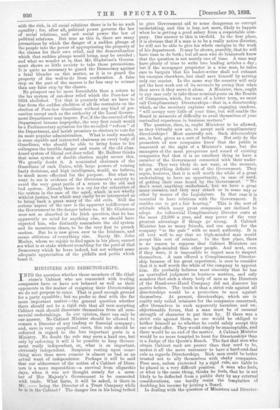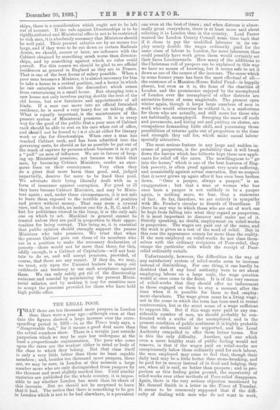MINISTERS AND DIRECTORSHIPS.
INTO the question whether those members of Mr. Glad- stone's Cabinet who are connected with trading companies have or have not behaved as well as their i opponents in the matter of resigning their Directorships we do not propose to enter. That is good enough ground for a party squabble ; but we prefer to deal with the far more important matter—the general question whether there should not be a rigid rule that all men accepting Cabinet rank should dissociate themselves from all corn- menial undertakings. In our opinion, there can only be one answer. No Cabinet Minister should be allowed to remain a Director of any trading or financial company ; and, save in very exceptional cases, this rule should be enforced in regard to the less important posts in a Ministry. No doubt the rule may seem a hard one, but only by enforcing it will it be possible to keep Govern- ment really independent, or, what is as important, obviously independent. Suspicion resting upon some- thing more than mere rumour is almost as bad as an actual want of independence. Perhaps it will be said that our abhorrence of the notion of a Cabinet of Direc- tors is a more superstition—a survival from oligarchic days, when it was not thought seemly for a mem- ber of Her Majesty's Government to be connected with trade. What harm, it will be asked, is there in Mr. 7— being the Director of a Trust Company while he is in the Cabinet P The danger lies in his being bribed to give Government aid to some dangerous or corrupt undertaking, and this is less, not more, likely to happen when he is getting a good salary from a respectable com- pany. Our answer to this is twofold. In the first place, it is obvious that if a man is to be a really active director, he will not be able to give his whole energies to the work of his department. It may be shown, possibly, that he will have time to do both; but all men who do brainwork know that the question is not merely one of time. A man may have plenty of time to write two leading articles a day ; but if the newspaper proprietor is a wise man, he takes care to bargain that his leader-writer shall not exhaust his energies elsewhere, but shall save himself by serving only one master. In the same way the country will only get the best work out of its servants by seeing that when they serve it they serve it alone. A Minister, then, ought in any case only to take those nominal posts on the Boards of Companies, which, for want of a better term, we must call Complimentary Directorships—that is, a directorship which, as the secretary explains with engaging candour, " will occupy very little of your time, but will enable the Board in moments of difficulty to avail themselves of your unrivalled experience in business matters."
The question, then, is, ought Ministers to be allowed, as they virtually now are, to accept such complimentary directorships ? Most assuredly not. Such directorships are, in fact, given as a sort of bribery. Not only do the promoters of new companies know that the public is reassured at the sight of a Minister's name, but the managers of the most prosperous and sound of existing companies feel that it is an excellent thing to have a member of the Government connected with their under- taking. They very likely do not w,ant, at the moment, to get anything definite out of the Government. They argue, however, that it is well worth the while of a great undertaking to have an opportunity, in case of need, of getting their case heard by the Government. " We don't want anything •underhand, but we have a great many enemies, and they may attack us in some way or other by means of the Legislature. In that case it is essential to have relations with the Government. It enables one to get a fair hearing." This is the sort of attitude which many great companies are inclined to adopt. An influential Complimentary Director costs at the most £2,000 a year, and may prove of the very greatest advantage if things go wrong. A Cabinet Minister has so many friends, and can speak for the company "in the gate" with so much authority. It is all very well to say that no high-minded man would accept this sort of retainer. In the first place, there is no reason to suppose that Cabinet Ministers are more high-minded than other people. And next, even if they were, it is impossible to expect men to suspect themselves. A man offered a Complimentary Director- ship because of his great experience, is sure to consider that it is well worth the while of the company to appoint him. He probably believes most sincerely that he has an unrivalled judgment in business matters, and only wonders that such a sharp body of men as the Directors of the Hand-over-Hand Company did not discover his merits before. The truth is that a strict rule against all directorships would be a protection to men against themselves. At present, directorships, which are in reality only veiled retainers for the companies concerned, offer themselves in such apparently harmless and un- objectionable forms, that a man must be of unusual strength of character to put them by. If there was a strict rule against them, no one would be obliged to bother himself as to whether he could safely accept this one or that offer. They would simply be unacceptable, and there would be an end of the matter. A Cabinet Minister would be no more tempted to hunt for Directorships than is a Judge of the Queen's Bench. The fact that men who obtain Cabinet rank are poorer than they used to be, makes it all the more necessary to have a hard-and-fast rule as regards Directorships. Rich men could be better trusted not to ally themselves with shaky companies. Poor men, unless protected by a rigid rule, are liable to be placed in a very difficult position. A man who feels, or what is the same thing, thinks he feels, that he is not likely to be deflected from a public duty by any external considerations, can hardly resist the temptation of doubling his income by joining a Board. In dealing with the question of Ministers and Director- ships, there is a consideration which ought not to be left out of account. If the rule against Directorships is to be rigidly,enforced and Ministerial office is not to be restricted to rich, men, it is absolutely necessary that Ministers should be well paid. Their present salaries are by no means too large, and if they were to be cut down as certain Radicals desire, we should, sooner or later, see influence with the Cabinet obtained by something much worse than director- ships, and by something against which, no rules could prevail. For this reason we should be glad to,see official residences as general in England as they are in France. That is one of the best forms of salary possible. When a poor man becomes a Minister, it is almost necessary for him to take a house in a central position, and a house in which he can entertain without the discomfort which comes from entertaining in a small house. But changing into a new house not only involves paying double the rent of the old house, but new furniture and appointments of all kinds. If a man can move into an official furnished residence, he is saved a very heavy fine on taking office. What is equally important, is the maintenance of the present system of Ministerial pensions. It is in every way for the good of the public that a poor man of Cabinet rank should be able to rest on his oars when out of office, and should not be forced to Lust about either for literary work or else for directorships. When once a man has reached Cabinet rank, and has been admitted into the governing caste, he should as far as possible be put out of the reach of capture by persons whose business it is to get a " pull" on men of influence. We are in favour of keep- ing up Ministerial pensions, not because we think that men, by becoming Cabinet Ministers, confer an enor- mous boon on their countrymen. Very often they do a great deal more harm than good, and, judged impartially, deserve far more to be fined than paid. We advocate their being liberally dealt with as a form of insurance against corruption. For good or ill they have become Cabinet Ministers, and may be Minis- ters again ; and, under these circumstances, it is not safe to leave them exposed to the terrible ordeal of position and power without money. That may seem a cynical view, and is, no doubt, an untrue one for A, B, C, and D ; but for politicians viewed in the lump, it is the only safe one on which to act. Mankind in general cannot be trusted unless they are paid in proportion to their oppor- tunities for being corrupt. This being so, it is essential that public opinion should strongly support the poorer Ministers who take pensions. We trust that when the present Cabinet goes out those of its members who are in a position to make the necessary declaration of poverty—there would not be more than three, for this, oddly enough, is a Cabinet of Capitalists—will not hesi- tate to do so, and will accept pensions, provided, of course, that there are any vacant. If they do, we may, we trust, rely upon the Unionist leaders to stamp out ruthlessly any tendency to use such acceptance against them. We can only safely get rid of the directorship nuisance and scandal by maintaining the present Minis- terial salaries, and by making it easy for sensitive men to accept the pensions provided for those who have held high public office.



































 Previous page
Previous page